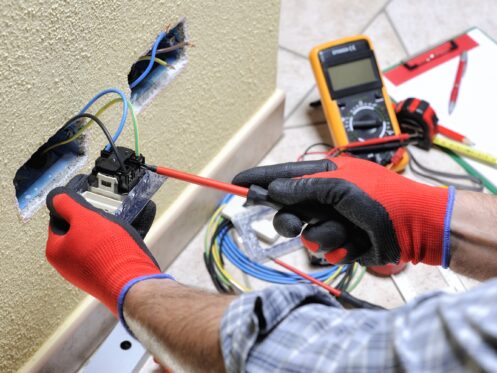When it comes to a home electrical system’s safety and functionality, few elements are as important as the structure’s wiring. Unsurprisingly, this means there may be times when rewiring the house is necessary. As a homeowner, you should understand when rewiring is necessary and why. Here is a closer look at how you can tell if you ought to rewire your house with help from an electrical services professional.
Old Wiring
Wiring ages like anything in your house, and you may need to look at rewiring at least part of your home if the wiring is older than 40 years. Wires can degrade over the years for a host of reasons, including internal heat, corrosion, vibration, cracking, physical damage and more. You may notice that certain outlets don’t work as well as they once did. Also, a specific circuit breaker might keep kicking off. In extreme cases, there could be a smell from burning materials because of a bare wire.
Also, the older wiring in a house might not be up to code. In a house that’s older than a century, there could be something as primitive as knob-and-tube wiring that uses a simple wire or even fabric coating. Aluminum wiring is common in mid-20th-century electrical systems, too. Rewiring is an opportunity to upgrade these older systems to modern solutions.
Additions and Other Renovations
Adding a new room to your house is an exciting time. However, the wiring in your home likely isn’t ready to handle the addition of a new room. The upside is that running wiring to a new room is a fairly standard job for our electricians. You will need to plan for the room’s expected use case, but we can easily run new wires in most cases.
Similar issues can occur during renovations. This is especially true if you’re converting a room from one use to another. For example, some folks want to relocate a house’s kitchen during a remodel. Kitchen appliances are some of the highest-draw systems in a home. Consequently, the wiring in the new kitchen has to have the capacity to handle the added draw. Suppose you want to convert a dining room to a kitchen. In that scenario, the old dining room’s wiring probably isn’t going to handle the draw of a refrigerator, microwave or dishwasher. We can rewire the new kitchen to handle the elevated electrical demand.
Insufficient Amperage
Every circuit in your house needs to have an amperage rating that matches or exceeds the expected electrical draw at the end. However, people often avoid maintaining this match. A classic problem is that a previous homeowner might have been running power tools in the garage. The tools kept throwing the breaker so the previous homeowner installed a bigger breaker.
What is the problem? The problem is that a bigger circuit breaker could pass more amperage than the wiring can handle. While the circuit breaker has safety systems to prevent overload, the wire does not. An excess load produces energy that has to go somewhere, and it often goes out of the wire into the wiring insulation as waste heat. If the amperage exceeds the wire’s rating, the heat could slowly melt the insulation and leave an exposed wire.
It is a good idea to have one of our electricians check that the wiring and breaker on every circuit match. If not, then the system needs rewiring.
Modern Safety Solutions
Ground- and arc-fault circuit interrupters are systems inside a circuit that detect problems and cut power. For example, you may see a GFCI on an outlet that’s near water, such as in a kitchen, bathroom or outdoor area. The outlet typically has an indicator light that shows whether there’s a fault condition. Also, it usually has a reset button so you can restore power. An AFCI works similarly, but it detects power disturbances.
GFCI and AFCI solutions are still not everywhere, even though they are very desirable. They require wiring to deal with fault conditions. Consequently, adding the wiring for a GFCI or AFCI is a reason to rewire a house.
Selling the House
Finally, many folks rewire a house before selling it. This assures the next owner that there aren’t any problems, potentially driving up the price. Rewiring also reduces your liability exposure because you can tell a new owner exactly what’s in the walls.
CMC Electric proudly serves Raleigh, NC and the surrounding areas. We work on wiring, fan installations, generators, whole-house surge protectors, and more. If you’re worried that your house might require rewiring, call CMC Electric today.

